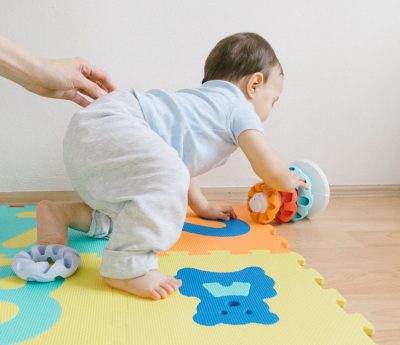Can newborn babies benefit from Pediatric Occupational Therapy?
by Chani Stewart OTR
Congratulations on the birth of your new baby! Welcome to the world of parenting which is one of the most rewarding and challenging roles you may ever play.
Sleepless nights, frequent bouts of crying, and feeding-related challenges are all things that parents face with their newborns.
Many parents are left wondering:
- “Is my baby’s behavior typical for a newborn?”
- “Why are sleeping and feeding so difficult? Should I follow up with a specialist?”
- “What intervention could be helpful?”
- “Will my child grow out of his/her positioning preference?”
The First Year of Life
The first year of life is almost magical regarding the skills and developmental milestones that babies reach. The first three months of a newborn’s life, dubbed by some pediatricians the “4th Trimester,” are filled with many changes and developmental skills as babies begin to adjust and get comfortable in this new world outside of the womb. Pediatric Occupational Therapy can benefit children from the early newborn ages to develop the skills and milestones they should reach along the way.
Born with Reflexive Motor Movements

Babies are born with reflexive motor movements including sucking, stepping, rooting, gripping (palmar grasp), curling the toes (plantar grasp), and others. As babies continue to develop and meet developmental milestones, voluntary movements begin to take the place of reflexes. The most important way to facilitate meeting motor milestones and setting the stage for engagement in voluntary movement is by having your baby engage in tummy time. Your baby’s development needs to spend as much awake time in the prone position (on the stomach) as possible. While a newborn will show only minimal movements in this prone position, supervised tummy time at this age is very important and beneficial. Pushing through the arms, hands, and shoulders, lifting the head and turning it from side to side, etc. focuses on improving strength and coordination for the neck, arms, and back. Tummy time is of primary importance in preparation for all other developmental milestones.
Sometimes, parents notice that their baby has a preference for looking in one direction or keeping their head positioned with a side bend or tilt. This may be due to positioning in utero or from a positioning preference that developed after birth. Head positioning preference may indicate torticollis which is a shortening of a muscle of the neck called the SCM – sternocleidomastoid. The torticollis pattern usually presents as a preference with cervical neck rotation toward one direction and side bending toward the opposite direction.
Early intervention is key for treatment of torticollis!
Early intervention is key for the treatment of torticollis! It often takes just a few therapy sessions for parents to learn simple stretches to work on with their baby. Tummy time speaks directly to torticollis as well, increasing Baby’s neck strength. Tricks for increasing Baby’s tolerance for tummy time and engaging him/her to rotate the neck and look equally toward both directions are strong focuses in therapy as well. Most importantly, parents and caregivers will become confident with the things that they can do to improve their baby’s head position and facilitate the appropriate progression of developmental milestones. These interventions can usually address torticollis quickly and without residual symptoms.
Sometimes torticollis also comes along with tongue and lip ties, known as ankyloglossia. Tongue ties can make breastfeeding or bottle feeding difficult for babies and their parents. A mother might experience significant pain with breastfeeding – sometimes along with bleeding, cracked nipples, or blisters. Baby may have a poor bottle latch as well and may not be gaining adequate weight due to his/her challenge with ingesting adequate amounts of milk. Occupational or physical therapy is often the first route to explore when dealing with a tongue tie, even before having it released. “Body work” is the way lactation consultants often refer to therapy at this stage of life. Baby’s general motor skills and oral motor skills are all addressed during therapy sessions.
Pediatric Occupational Therapy often helps parents feel empowered with the knowledge that they have the tools they need to confidently provide for their babies and to make the newborn experience so much more enjoyable for everyone.
Therapy SPOT – Bellaire is an outpatient pediatric clinic located in Bellaire, Houston, Texas. We offer a variety of multi-disciplinary pediatric therapy services including occupational therapy, physical therapy, speech therapy, and social work services to children of all ages.
Downloadable Pediatric Occupational Therapy brochure from- AOTA
About the Author

Chani Stewart OTR
Occupational Therapist

